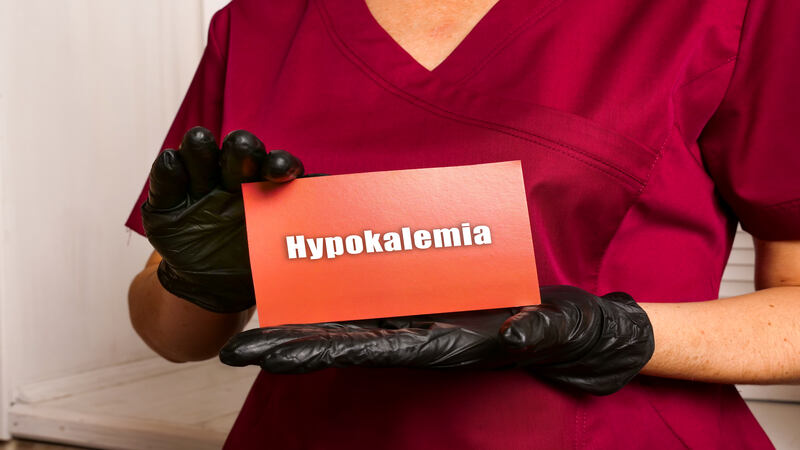 Pregnancy causes hormonal changes and maintaining a potassium-rich diet is crucial for regulating fluid balance, nerve function, and muscle contractions. Potassium also supports fetal growth and helps prevent complications like preeclampsia. Understanding the benefits of potassium for both the mother and the fetus is essential. Low levels of potassium cause hypokalemia and this cannot be ignored during pregnancy.
Pregnancy causes hormonal changes and maintaining a potassium-rich diet is crucial for regulating fluid balance, nerve function, and muscle contractions. Potassium also supports fetal growth and helps prevent complications like preeclampsia. Understanding the benefits of potassium for both the mother and the fetus is essential. Low levels of potassium cause hypokalemia and this cannot be ignored during pregnancy.
Hypokalemia, or low potassium levels, during pregnancy, can result from an imbalanced diet. Common symptoms include nausea, fatigue, and muscle weakness. Regular check-ups with your expert are important to monitor potassium levels and address any concerns. Increasing intake of potassium-rich foods can help manage mild cases of hypokalemia during pregnancy.
What is Hypokalemia?
Hypokalemia is low potassium in the blood, which affects nerve and muscle cells. 98% of potassium is inside cells. Even a small change in the remaining 2% can have severe effects, especially on the heart. The kidneys regulate potassium levels by removing excess through urine.
What is Potassium?
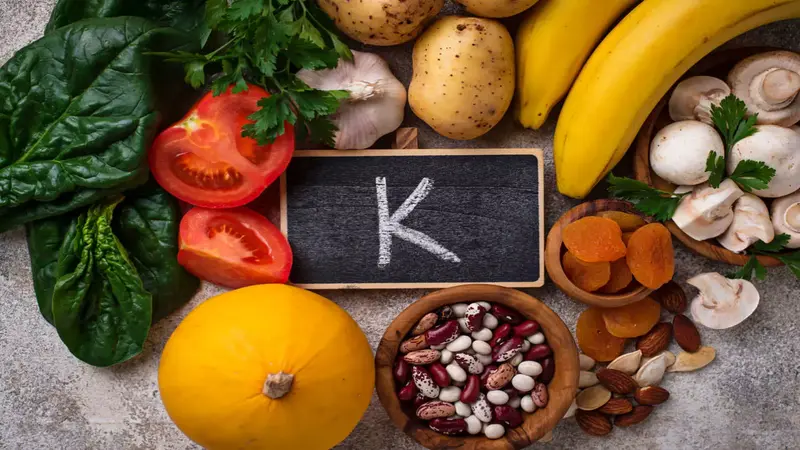
Potassium is an essential micronutrient needed to perform vital functions. It is naturally present in all food sources and supplements. This mineral maintains fluid volume and electrolyte balance, helps muscles to contract, and regulates blood pressure. Potassium is a nutrient of public health concern, and it is important to read nutrition labels to ensure adequate intake (1).
Why Is Potassium Important In Pregnancy?
Potassium is crucial for everyone, but it plays a vital role for pregnant and breastfeeding women by alleviating fluid retention (2), balancing electrolytes (3), and easing restless leg syndrome (4) and cramps, which are sources of discomfort during pregnancy.
How Much Potassium Does A Pregnant Woman Need?
As per World Health Organization/Food and Agriculture Organization/United Nations University (WHO/FAO/UNU) reports recommendations for the potassium ranges between 3 and 5 g/d. This may vary depending on the conditions and complications if any during pregnancy (5).
What is the Normal Level of Potassium in Blood During Pregnancy?
During pregnancy, it’s important to carefully balance potassium levels to prevent hypokalemia. Monitoring for signs of kidney disease, heart disease, and metabolic conditions like diabetes is crucial. The normal level of potassium in the bloodstream is 3.5 to 5 millimoles per liter.
- During the first trimester potassium in the range of 3.6 to 5 mmol/l
- During the second trimester 3.3 to 5 mmol/l,
- During the third trimester, 3.3 to 5.1 mmol/l are normal (6).
Once the potassium level falls below this level, the situation of hypokalemia occurs.
How Does Hypokalemia Affect My Pregnancy?

Hypokalemia is a very dangerous situation to arise during pregnancy as it can harm both the mother and the unborn child.
- It results in insufficient gastrointestinal motility and functioning (7)
- It causes too much excitability in the nerve tissues, heart, and muscles resulting in numbness (8) and muscular necrosis along with renal complications (9)
- Can mutate your genes when hypokalemia accompanies chronic hypertension- a condition called Geller’s syndrome (10)
- Obstetric complications such as Preterm Labour; increased potassium loss from the skin, GI tract, and even kidneys; irregular heart rate, and even hemorrhage (11)
What are the Symptoms of Hypokalemia During Pregnancy?

Initial symptoms are very hard to recognize as most of them are common during pregnancy, almost in all women.
Primary Symptoms in Mild Cases of Hypokalemia are
- Constipation
- Muscle cramps
- Fatigue and numbness
- Nausea and vomiting
- Abdominal cramping and bloating
Primary Symptoms in Severe Cases of Hypokalemia are :
- Irregular heartbeats
- Passing large amounts of urine
- Feeling thirsty
- Breathing problems
- Unable to move the limbs
Emotional Problems That Surface Due to Hypokalemia During Pregnancy are :
- Depression
- Confusion
- Hallucination
What Causes Hypokalemia During Pregnancy?

Many factors can trigger Hypokalemia during pregnancy. Here are some of the top reasons for hypokalemia during pregnancy.
1. Vomiting and Diarrhea During Pregnancy
A significant amount of vomiting, which is associated with morning sickness or an attack of diarrhea during the first trimester can result in potassium loss from the intestine.
2. Use of Diuretics
Diuretics are medicines used for treating high blood pressure. Using diuretics causes increased urination resulting in low potassium levels.
3. Use of Antibiotics
Using certain antibiotics during pregnancy like gentamicin and carbenicillin can cause hypokalemia.
4. Increased Level of Aldosterone
The adrenal gland secretes the steroid hormone-Aldosterone, which has a vital role in maintaining the pH and electrolyte level of blood. During pregnancy, an increase in the level of this hormone can result in the loss of potassium through urine.
How is Hypokalemia Diagnosed During Pregnancy?
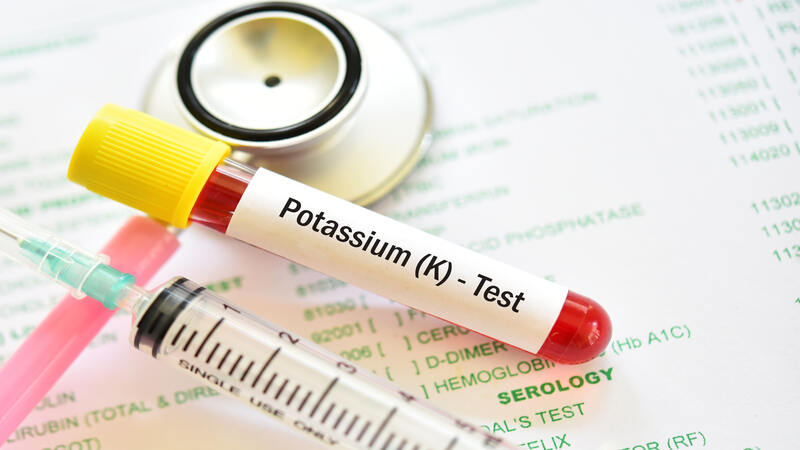
Low potassium can be diagnosed with a routine blood test done during pregnancy. Irregular heartbeats can be caught in an ECG.
How Can Hypokalemia During Pregnancy Be Treated?
The management of hypokalemia involves dietary modifications, recommending supplements if any, and if it worsens, administering potassium intravenously to restore normal levels and prevent future complications.
1. Modifying the Current Menu with Potassium Rich Food
Include the food items which have a sufficient amount of potassium like bananas, tomato, spinach, white bean, mushroom, fish, avocados, yogurt, potatoes, etc. It will help to raise the amount of potassium naturally during pregnancy.
2. Increasing Electrolyte Intake
Increasing the intake of electrolytes to 2000 mg per day will help to keep up the potassium level with the rising blood volume.
3. Oral Potassium Supplements
Oral potassium replacement therapy will be enough to treat mild or moderate hypokalemia (2.5 to 3.5 millimoles per liter). Potassium supplements are available in different forms like capsules, tablets, powder, and liquid. The body absorbs oral potassium quickly. The dosage depends upon the requirement.
4. Intravenous Administration
If the potassium level is less than 2.5 millimoles per liter, more aggressive treatment like intravenous administration of potassium is needed. Potassium can be highly irritating to the veins. Hence, the procedure is usually done under close supervision to avoid heart irritation.
What Are The Food Sources Of Potassium?
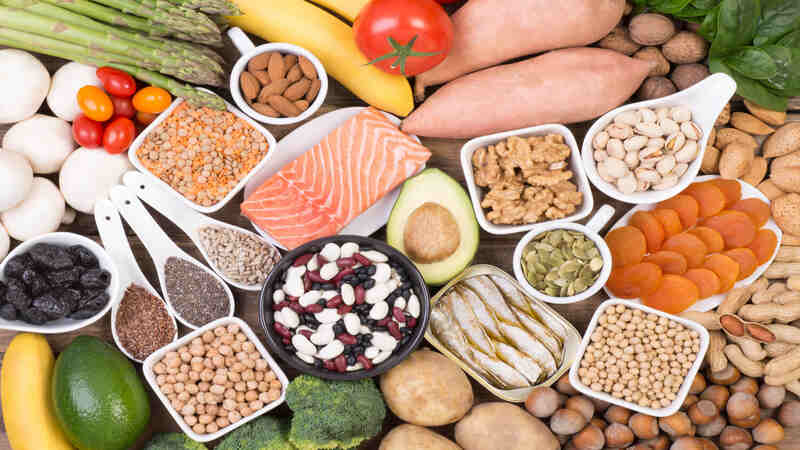
Potassium is already found in a variety of foods that you consume daily. However, consider adding the following items to your diet if you need to increase your potassium intake. It is observed that potassium is found in fruits and vegetables 80-85% in the form of phosphates, sulfates, and citrates whereas Potassium Chloride is available in dietary supplements and sea salt. One should even read labels to check the potassium content (12)
The table shows the Potassium content of foods from different Food Groups.
| Food | Standard portion size in (g) | Energy in standard portion in (kcal) | Potassium in standard portion in (mg) |
| Potato, baked, flesh and skin | 1 small potato (143) | 128 | 738 |
| Prune juice, canned | 1 cup (256) | 182 | 707 |
| Carrot juice, canned | 1 cup (236) | 94 | 689 |
| Tomato paste | 1/4 cup (65.5) | 54 | 664 |
| Beet greens, cooked | 1/2 cup (74.5) | 19 | 654 |
| White beans, canned | 1/2 cup (90) | 149 | 595 |
| Tomato juice, canned | 1 cup (243) | 41 | 556 |
| Plain yogurt, nonfat or low fat | 8 oz (245) | 127–143 | 531–579 |
| Tomato puree | 1/2 cup (125) | 48 | 549 |
| Sweet potato, baked in skin | 1 medium (119) | 103 | 542 |
| Orange juice, fresh | 1 cup (248) | 112 | 496 |
| Tuna, yellowfin, cooked | 3 oz (57) | 118 | 484 |
| Bananas | 1 medium (118) | 105 | 422 |
| Skim milk | 1 cup (245) | 83 | 382 |
| Parsnip, boiled | 1/2 cup (80.5) | 55 | 296 |
| Green peas, boiled | 1/2 cup (82.5) | 37 | 217 |
| Corn, boiled, sweet yellow | 1/2 cup (79) | 72 | 162 |
| Cauliflower, boiled | 1/2 cup (70) | 14 | 8 |
Prevention Of Hypokalemia During Pregnancy

You can reduce the risk of hypokalemia during pregnancy by including potassium-rich foods in your pregnancy diet. In case you are having gestational diabetes or gestational hypertension, manage it well. Also, increase the intake of electrolytes.
In case of low potassium, reduce the physical exertion. Regular, routine checkups and prenatal appointments are the keys to identifying and treating any problem, so ensure that you do not miss them.
Low Potassium Level And Miscarriage
Potassium levels when low disrupt overall homeostasis, specifically electrolyte balance in the body. Hypokalemia results in hypomagnesemia (13) and hypocalcemia (14) which shows abnormalities such as hemorrhage (vaginal and periventricular (15), and edema in pregnant mothers. Hence, pregnant mothers must maintain potassium levels to avoid miscarriage
The Effect Of Hypokalemia In Pregnancy On Fetal Heart Rate
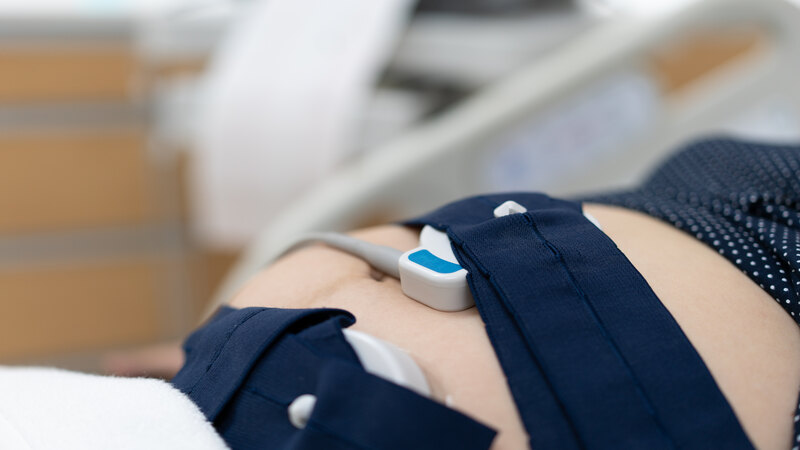
Potassium if not maintained inside your own causes severe distress on the fetal heart. The increased fetal demand for potassium might affect homeostasis resulting in fetal heart abnormalities such as fetal bradycardia (16). This, however, affects the growth and development of the fetus which should not be neglected
Potassium is essential for the body. Excessive Nausea, vomiting (17), and diarrhea cause hypokalemia during pregnancy, resulting in weakness and arrhythmia. Early diagnosis and treatment are crucial. A balanced diet, electrolyte balance, and prenatal care can help prevent hypokalemia during pregnancy.
FAQ’s
1. Is Hypokalemia in Pregnancy Common?
No, it is not. It is very rare. It is caused by low potassium levels.
2. Can Hypokalemia in Pregnancy Cause Heart Problems?
Yes, it can. Abnormal heart rhythm is one of the main symptoms. Calcium is given to improve this condition.
3. How is Hypokalemia in Pregnancy Treated?
It’s treated by giving potassium. It can be given orally or through IV. In case of cardiac arrhythmia, calcium is given through IV.
4. Is Hypokalemia in Preeclampsia Dangerous?
Yes, it is. It can cause muscle weakness leading to respiratory issues. This can even be fatal.
5. What Happens If You Have Low Potassium While Pregnant?
Low potassium can cause weakness, fatigue, muscle cramps, constipation, and abnormal heart rhythms. It is also associated with a lower risk of gestational diabetes (18) and severe pre-eclampsia during the first half of pregnancy.
6. How Can I Increase My Potassium Levels During Pregnancy?
During pregnancy, it’s crucial to get proper prenatal care and eat a healthy diet rich in potassium. Foods like dried apricots, prunes, raisins, orange juice, bananas, acorn squash, potatoes, spinach, tomatoes, and broccoli support fetal development and help prevent complications like eclampsia.
7. What Causes Hyperkalemia In Pregnancy?
Hyperkalemia during pregnancy is often caused by chronic vomiting, diarrhea, or certain diuretics, rather than a dietary deficiency. This can indicate underlying metabolic and renal issues and is linked to a significant risk of severe atherosclerotic illness.
8. What Is A Dangerously Low Potassium Level?
Acquired or congenital, hypokalemic myopathy(19) leads to low potassium levels (<3.5 meq/L) and severe muscle weakness, ranging from numbness to paralysis.
References
- National Institutes of Health – Potassium – https://ods.od.nih.gov/factsheets/Potassium-HealthProfessional/
- Obstetric Anesthesia Handbook, 2010 ISBN : 978-0-387-88601-5 Sanjay Datta, Bhavani Shankar Kodali, Scott Segal – https://link.springer.com/chapter/10.1007/978-0-387-88602-2_1
- Ahmed A. Fetomaternal Acid-Base Balance and Electrolytes during Pregnancy. Indian J Crit Care Med. 2021 Dec;25(Suppl 3):S193-S199 – https://www.ncbi.nlm.nih.gov/pmc/articles/PMC9108779/
- Hueston WJ, Kasik-Miller S (1998) Changes in functional health status during normal pregnancy. J Fam Pract 47:209–212 – https://link.springer.com/article/10.1007/s11325-021-02311-5
- Strohm D, Ellinger S, Leschik-Bonnet E, Maretzke F, Heseker H; German Nutrition Society (DGE). Revised Reference Values for Potassium Intake. Ann Nutr Metab. 2017;71(1-2):118-124. – https://www.ncbi.nlm.nih.gov/pmc/articles/PMC5639605/
- Abbassi-Ghanavati M, Greer LG, Cunningham FG. Pregnancy and laboratory studies: a reference table for clinicians. Obstet Gynecol. 2009 Dec;114(6):1326-31 – https://www.perinatology.com/Reference/Reference%20Ranges/Potassium.htm
- Danny Castro1; Sandeep Sharma- Baylor College of Med, TX Children Hosp Mery Fitzgerald Hospital – https://www.ncbi.nlm.nih.gov/books/NBK482465/
- Kulkarni M, Tv S, Gopal N. Hypokalemic paraplegia in pregnancy. J Clin Diagn Res. 2014 Jun;8(6) – https://www.ncbi.nlm.nih.gov/pmc/articles/PMC4129316/
- Dr. Jayaraman Muthukrishnan, Department of Endocrinology, Medwin Hospital, Hyderabad – https://journals.lww.com/sjkd/fulltext/2010/21060/pregnancy_predisposes_to_rhabdomyolysis_due_to.19.aspx
- S.S. BIN RHASBUDIN SHAH, V. Crawford, L. Williams, A. Gupta, WCN23-1210 FIRST REPORTED CASE OF GELLER SYNDROME OUTSIDE NORTH AMERICA. Abstract paid for submission 2022-A-WCN23 1137(200026936629), Kidney International Reports, Volume 8, Issue 3 – https://www.sciencedirect.com/science/article/pii/S2468024923002681
- Yang CW, Li S, Dong Y. The Prevalence and Risk Factors of Hypokalemia in Pregnancy-Related Hospitalizations: A Nationwide Population Study. Int J Nephrol. 2021 Jun 28;2021 – https://www.ncbi.nlm.nih.gov/pmc/articles/PMC8261188/
- Christian Demigné, Houda Sabboh, Christian Rémésy, Pierre Meneton, Protective Effects of High Dietary Potassium: Nutritional and Metabolic Aspects, The Journal of Nutrition, Volume 134, Issue 11 – https://www.sciencedirect.com/science/article/pii/S0022316623028626#s0005
- Enaruna, NO; Ande, ABA; Okpere, EE. Clinical significance of low serum magnesium in pregnant women attending the University of Benin Teaching Hospital. Nigerian Journal of Clinical Practice 16(4):p 448-453, Oct–Dec 2013. – https://journals.lww.com/njcp/fulltext/2013/16040/clinical_significance_of_low_serum_magnesium_in.8.aspx
- Bako, B; El-Nafaty, AU; Mshelia, DS1; Gali, RM2; Isa, B; Dungus, M M1. Prevalence and Risk Factors of Hypocalcemia Among Pregnant and Non-Pregnant Women in Maiduguri, Nigeria: A Cross-Sectional Study. Nigerian Journal of Clinical Practice 24(1):p 75-80, January 2021 – https://journals.lww.com/njcp/fulltext/2021/24010/prevalence_and_risk_factors_of_hypocalcemia_among.12.aspx
- Ryan Starr; Orlando De Jesus; Sanket D. Shah; Judith Borger. – Cape Fear Valley/Campbell University, University of Puerto Rico, Medical Sciences Campus, Neurosurgery Section, University of Florida, Campbell Un. School of Osteopathic Medicine – https://www.ncbi.nlm.nih.gov/books/NBK538310/
- Westphal DS, Hauser M, Beckmann BM, Wolf CM, Hessling G, Oberhoffer-Fritz R, Wacker-Gussmann A. Fetal Bradycardia Caused by Monogenic Disorders-A Review of the Literature. J Clin Med. 2022 Nov 22;11(23):6880 – https://www.ncbi.nlm.nih.gov/pmc/articles/PMC9741304/
- Lans HS, Gollin HA, Daro AF, Nora E. HYPOKALEMIA DUE TO PERSISTENT VOMITING DURING PREGNANCY. JAMA. 1953;153(11):1012–1015 – https://jamanetwork.com/journals/jama/article-abstract/289204
- Coregliano-Ring L, Goia-Nishide K, Rangel ÉB. Hypokalemia in Diabetes Mellitus Setting. Medicina (Kaunas). 2022 Mar 16;58(3):431 – https://www.ncbi.nlm.nih.gov/pmc/articles/PMC8954285/
- Kulkarni M, Tv S, Gopal N. Hypokalemic paraplegia in pregnancy. J Clin Diagn Res. 2014 Jun;8(6):OD03-4 – https://www.ncbi.nlm.nih.gov/pmc/articles/PMC4129316/
